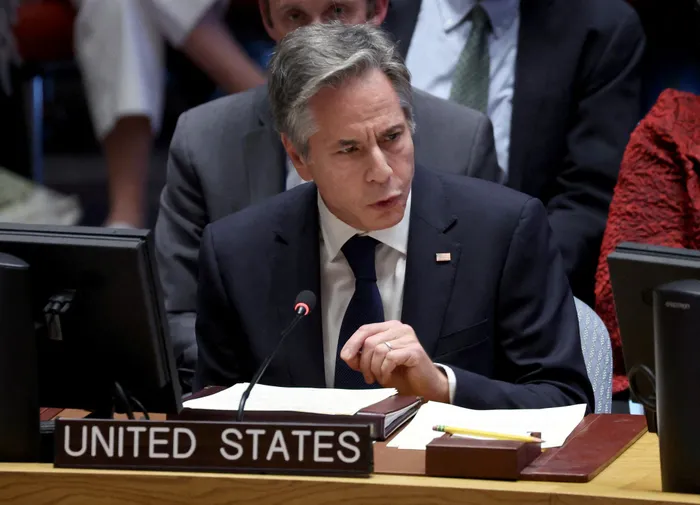Seven main takeaways from United Nations Security Council open debate on Israel-Hamas war

US Secretary of State Antony Blinken speaks during a meeting of the Security Council on the conflict between Israel and Hamas at UN headquarters in New York. Picture: Shannon Stapleton/Reuters
The United Nations Security Council has held its first open debate on the Israel-Gaza war on Tuesday. The debate led to a diplomatic standoff, with multiple resolutions failing to gain consensus.
Out of the 15-member council, most members called for an immediate ceasefire to allow humanitarian aid to reach Palestinians.
Previous hearings
The US, which is a long-standing ally of Israel, last week exercised its veto power to block a resolution that had received backing from 12 other Security Council members.
The primary point of contention was the resolution's perceived failure to emphasise Israel's right to self-defence. An earlier resolution proposed by Russia also faced rejection.
As the war in the Middle East continues to escalate, many echoed the urgent calls for a ceasefire and a cessation of the attacks on Palestinian civilians, highlighting the widespread destruction in Gaza and the mounting death toll.
We list the main takeaways, quotes, and highlights from the debate.
– Egypt's Foreign Minister Sameh Shoukry expressed regret over the Security Council's inability to adopt a resolution or call for an immediate ceasefire.
– Jordan's Foreign Minister, Ayman Safadi, accused Israel of "razing Gaza to the ground" and lamented the council's failure to call for a ceasefire.
– Despite the US being a staunch ally of Israel, US Secretary of State Antony Blinken favoured a "humanitarian pause" over a formal ceasefire, calling for the adoption of a new US-led resolution to incorporate substantive feedback. This resolution emphasises the "inherent right of all states" to self-defence while endorsing "humanitarian pauses" for aid, but not a full ceasefire.
Russia proposed its own counter-resolution, with a vote expected later in the week.
UN Secretary-General's Appeal
United Nations Secretary-General António Guterres reiterated his call for an immediate ceasefire, expressing concern about the violations of international humanitarian law and the alarming levels of destruction and civilian casualties in Gaza. He criticised the use of civilians as human shields and the collective punishment of the Palestinian people.
Guterres acknowledged the suffering of the Palestinian people over five decades, emphasising that the recent attacks by Hamas did not happen in isolation, a statement that drew sharp criticism from Israel's delegation.
"At a crucial moment like this, it is vital to be clear on principles, starting with the fundamental principle of respecting and protecting civilians," Guterres told the 15-member council.
Israel's Response
Israel's UN Ambassador Gilad Erdan called for Guterres' resignation in response to his remarks.
Israeli Foreign Minister Eli Cohen defended Israel's actions, stating that the "total destruction" of Hamas was the only proportionate response to their attacks.
Cohen said the war was imposed on Israel, but “it is not only Israel’s war, but it is a war on the free world.”
Cohen said Hamas is worse than Isis and even compared them to Nazis.
Palestinian Foreign Minister's Plea
Palestinian Foreign Minister Riyad al-Maliki called for an immediate ceasefire and an end to the ongoing violence, emphasising that only peace could make Israel safer. He urged collective action to stop the ongoing violence against the Palestinian civilian population.
“The Security Council is obliged to stop this (the violence); the global community has a duty under law to stop them. It's our human duty to stop them,” said al-Maliki.
Humanitarian Crisis in Gaza
As the war continues, a limited amount of humanitarian assistance has been allowed into Gaza, including supplies such as water, food, and medicine. However, UN agencies have warned about the deteriorating humanitarian situation, with a lack of fuel threatening essential services.
The UN agency for Palestinian refugees, UNRWA, announced it may have to halt operations in Gaza due to a lack of fuel. Additionally, more than one-third of hospitals in Gaza and nearly two-thirds of primary health care clinics have been forced to close due to damage or fuel shortages.
IOL